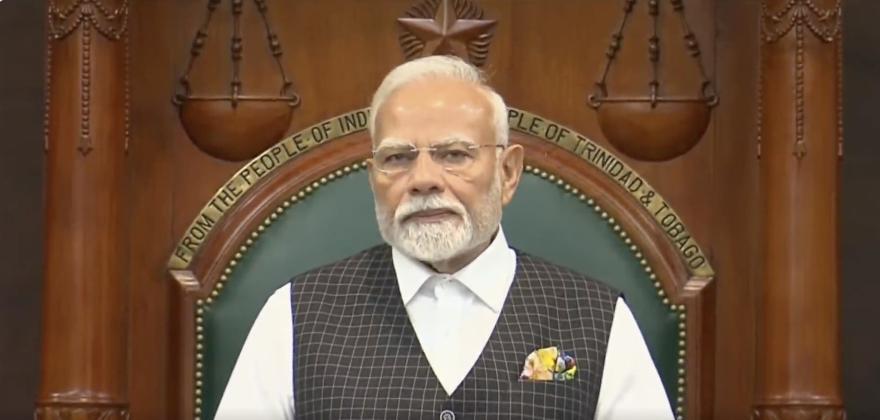
Glad to see so many women MPs: PM in Trinidad & Tobago parliament
Prime Minister Narendra Modi’s recent address to the joint assembly of Trinidad and Tobago’s parliament was marked by his warm words of appreciation for the significant presence of women members in the house. In his speech, Modi expressed his delight at seeing so many women MPs and emphasized the importance of respect for women in Indian culture. This heartwarming sentiment is a reflection of the country’s growing commitment to empowering women and promoting gender equality.
Modi’s statement is not just a nicety, but a testament to India’s journey towards a more inclusive and progressive society. In recent years, India has made significant strides in promoting women’s representation in politics, law, and other spheres. The country has seen a steady increase in the number of women MPs, with the current 78th Lok Sabha having the highest ever proportion of women members. This is a remarkable achievement, especially considering the country’s vast cultural and socio-economic diversity.
India’s commitment to empowering women is rooted in its rich cultural heritage. The country has a long tradition of valuing women’s contributions and recognizing their importance in society. From the ancient Vedic period to the present day, women have played a significant role in shaping Indian culture, art, and literature. The concept of “Nari Shakti” or women’s power is deeply ingrained in Indian society, and it is this cultural ethos that has driven India’s efforts to promote gender equality and women’s empowerment.
Modi’s statement is also significant because it highlights the importance of women’s participation in politics. In India, women’s representation in politics has been a long-standing issue, with women often facing barriers to entry and limited opportunities for advancement. However, in recent years, India has made significant progress in this area, with the number of women MPs increasing steadily. This growth in women’s representation is not just a statistical achievement, but a reflection of the country’s commitment to promoting gender equality and ensuring that women’s voices are heard in the political process.
Modi’s statement is also noteworthy because it acknowledges the important role that women are playing in India’s development. Women are leading the charge in various domains, from science and technology to education and entrepreneurship. They are also playing a vital role in promoting social and economic development, particularly in rural areas. The Prime Minister’s recognition of their contributions is a testament to the importance of women’s participation in India’s development journey.
In his speech, Modi also emphasized the need to strengthen women’s role in building a modern India. This is a critical aspect of India’s development strategy, as women are essential for building a strong and prosperous society. By empowering women, India can unlock their full potential and ensure that they play a key role in shaping the country’s future.
Modi’s statement is a welcome development, especially in the context of Trinidad and Tobago’s parliament, where women’s representation is still relatively low. The country has a long way to go in terms of promoting gender equality and ensuring that women are represented in all spheres of life. Modi’s words of encouragement and appreciation are a timely reminder of the importance of promoting women’s participation in politics and other areas.
In conclusion, Prime Minister Modi’s statement in Trinidad and Tobago’s parliament is a heartwarming expression of appreciation for the significant presence of women MPs. His words are a testament to India’s commitment to promoting gender equality and empowering women. As India continues to grow and develop, it is essential that women play a key role in shaping the country’s future. Modi’s statement is a reminder of the importance of promoting women’s participation in politics and other areas, and it serves as a powerful symbol of India’s progress towards a more inclusive and progressive society.






